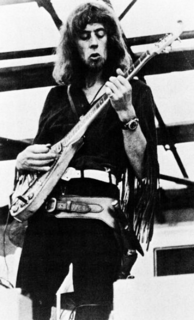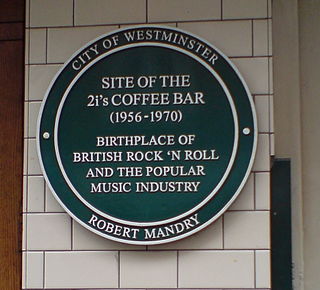Related Research Articles

The Quarrymen were a British skiffle/rock and roll group, formed by John Lennon in Liverpool in 1956, which evolved into the Beatles in 1960. Originally consisting of Lennon and several schoolfriends, the Quarrymen took their name from a line in the school song of their school, the Quarry Bank High School. Lennon's mother, Julia, taught her son to play the banjo, showed Lennon and Eric Griffiths how to tune their guitars in a similar way to the banjo, and taught them simple chords and songs.
Skiffle is a genre of folk music with influences from blues, jazz, and American folk music, generally performed with a mixture of manufactured and homemade or improvised instruments. Originating as a form in the United States in the first half of the 20th century, it became extremely popular in the UK in the 1950s, where it was played by such artists as Lonnie Donegan, The Vipers Skiffle Group, Ken Colyer, and Chas McDevitt. Skiffle was a major part of the early careers of some musicians who later became prominent jazz, pop, blues, folk, and rock performers, The Beatles and Rory Gallagher amongst them. It has been seen as a critical stepping stone to the second British folk revival, the British blues boom, and the British Invasion of American popular music.

Anthony James Donegan, known as Lonnie Donegan, was a British skiffle singer, songwriter and musician, referred to as the "King of Skiffle", who influenced 1960s British pop and rock musicians. Born in Scotland and brought up in England, Donegan began his career in the British trad jazz revival but transitioned to skiffle in the mid 1950s, rising to prominence with a hit recording of the American folk song "Rock Island Line" which helped spur the broader UK skiffle movement.

John Mayall & the Bluesbreakers are an English blues rock band led by singer, songwriter, and multi-instrumentalist John Mayall. While never producing a hit of their own, the band has been influential as an incubator for British rock and blues musicians. Many of the best known bands to come out of Britain in the 1960s and 1970s had members that came through the Bluesbreakers at one time, forming the foundation of British blues music that is still played heavily on classic rock radio. Among those with a tenure in the Bluesbreakers are Eric Clapton and Jack Bruce, Peter Green, Mick Fleetwood, and John McVie, Mick Taylor, Aynsley Dunbar and The Aynsley Dunbar Retaliation Jon Hiseman, Dick Heckstall-Smith and Tony Reeves, and numerous others.

Hank Brian Marvin is an English multi-instrumentalist, vocalist and songwriter. He is widely known as the lead guitarist for The Shadows, a group which primarily performed instrumentals and was the backing band for Cliff Richard, and subsequently for Marvin, Welch & Farrar.
Clinton Ford was an English popular singer of the 1950s and 1960s.

Chris Farlowe is an English rock, blues and soul singer. He is best known for his hit single "Out of Time" written by Mick Jagger and Keith Richards, which rose to No. 1 in the UK Singles Chart in 1966, and his association with bands Atomic Rooster, the Thunderbirds and Colosseum. Outside his music career, Farlowe collects war memorabilia.

Rory Storm was an English musician and vocalist. Born in Liverpool, Storm was the singer and leader of Rory Storm and the Hurricanes, a Liverpudlian band who were contemporaries of the Beatles in the late 1950s and early 1960s. Ringo Starr was the drummer for the Hurricanes before joining the Beatles in August 1962.
Terence "Jet" Harris was an English musician. He was the bass guitarist of the Shadows from 1958 until April 1962, and had subsequent success as a soloist and as a duo with the drummer Tony Meehan.
Wallace Victor "Wally" Whyton was a British musician, songwriter and radio and TV personality.
The Skiffle Sessions – Live in Belfast is a live album by Northern Irish singer-songwriter Van Morrison, with Lonnie Donegan and Chris Barber, released in 2000. Lonnie Donegan had played with the Chris Barber jazz band when he had his first hit with "Rock Island Line"/"John Henry" in 1955. He had been a childhood influence on Van Morrison, who had performed in his own skiffle band with schoolmates when he was twelve years old in Belfast, Northern Ireland. This was Donegan's second album in twenty years, reviving his career until his death in 2002.

Bobbie Clarke was an English rock drummer. He was regarded by critics as an important figure in the configuration of early British rock and roll, although he is often chiefly remembered for his long term association as the drummer with Vince Taylor and the Playboys.

The 2i's Coffee Bar was a coffeehouse at 59 Old Compton Street in Soho, London, that was open from 1956 to 1970. It played a formative role in the emergence of Britain's skiffle and rock and roll music culture in the late 1950s, and several major stars including Tommy Steele and Cliff Richard were first discovered performing there.
"Rock Island Line" is an American folk song. Ostensibly about the Chicago, Rock Island and Pacific Railroad, it appeared as a folk song as early as 1929. The first recorded performance of "Rock Island Line" was by inmates of the Arkansas Cummins State Farm prison in 1934.

Charles James McDevitt is a Scottish musician, one of the leading lights of the skiffle genre which was highly influential and popular in the United Kingdom in the mid-to-late 1950s.
The Vipers Skiffle Group – later known simply as The Vipers – were one of the leading British groups during the skiffle period of the mid to late 1950s, and were important in the careers of radio and television presenter Wally Whyton, coffee bar manager Johnny Martyn, wire salesman Jean Van den Bosch, instrument repairer Tony Tolhurst, journalist John Pilgrim, record producer George Martin, and several members of The Shadows.

Kris John Ife was an English singer and songwriter, who enjoyed modest success in Britain in the 1960s and 1970s. He recorded a version of "Hush", later covered by Deep Purple.
Saturday Club was an influential BBC Radio programme in the United Kingdom, broadcast on the BBC Light Programme and later BBC Radio 1 between 1957 and 1969. It was one of the earliest – and for several years almost the only – radio programme in the country to broadcast pop music. Its longest-serving and best remembered host was Brian Matthew.
Johnny Martyn, born Johnny Martyn Booker, was a musician and coffee bar manager. He was one of the original members of The Vipers Skiffle Group. Fellow musician and Vipers member Wally Whyton were members of The Original Soho Skiffle Group. He was born in London, England and died in Vancouver, British Columbia, Canada.
Van den Bosch is a Dutch toponymic surname, originally indicating either an association with a forest, with a place/dwelling named "Den Bosch" or with the city Den Bosch. In the Netherlands about 10,200 carried the name in 2007, while in Belgium 3,755 people were named Van Den Bosch and another 3,164 were named Vandenbosch, Vandebosch or Vanden Bosch in 2008. Other variant spellings are Van der Bosch and Van den Bos.